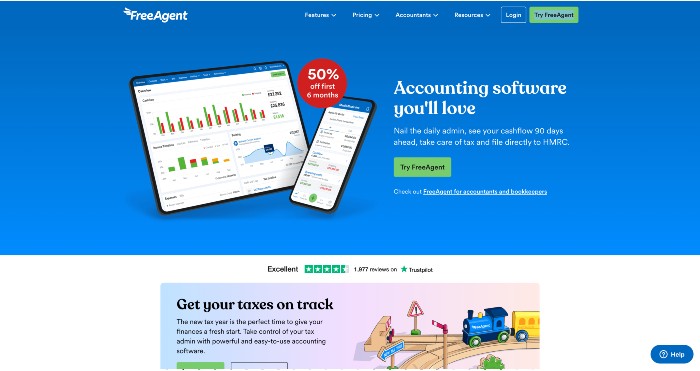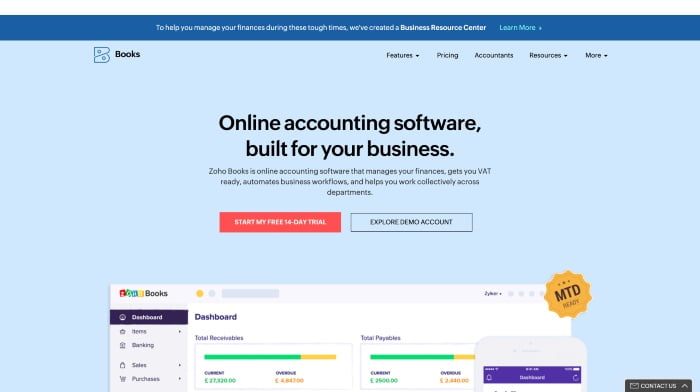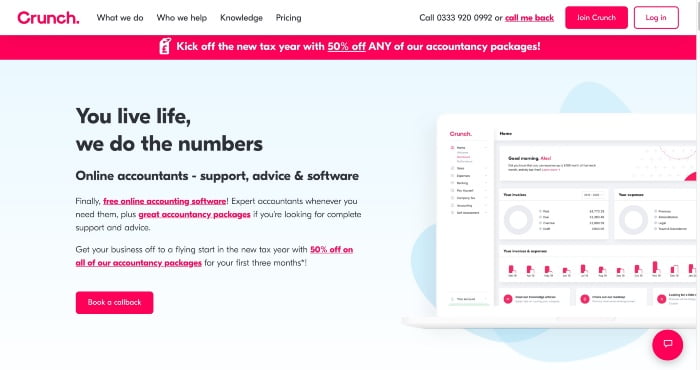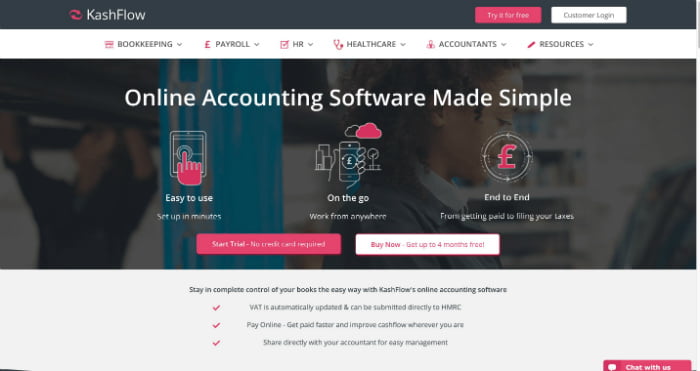When running a small business it’s important that you take accounting and bookkeeping seriously.
It’s not just something you need to do to comply with the UK tax system, well-organised accounts will help you better plan and forecast your company’s profitability. Here we look at the best accounting software reviews for UK businesses our expert team have conducted.
Best Small Business Accounting Software – Top 5 Picks
| Accounting Software | Cheapest Package | Ease Of Use | Our Rating | Review | Official Site |
|---|---|---|---|---|---|
 | £19/mo | Excellent | 9.4 | Read Review | Visit Website |
 | FREE | Outstanding | 9.3 | Read Review | Visit Website |
 | £12/mo | Excellent | 9.3 | Read Review | Visit Website |
 | £15/mo | Good | 9.2 | Read Review | Visit Website |
 | FREE | Average | 9.2 | Read Review | Visit Website |
What Is Accounting Software?
These days, accounting software can describe anything from basic bookkeeping software, through to advanced accounting software that calculates and submits tax returns for you. The majority of software is now hosted online.
Whatever the level your chosen software is at, it’s designed to help you keep all of your business finances in order and comply with all of the legal reporting requirements.
Often, the software will be able to create and send invoices, keep a track of expenses, and connect with your bank account to monitor transactions. This all creates a place for you to stay on top of your finances without taking time away from doing what you do best – running your business.
Why Should You Use It?
Good accounting software is primarily about saving you time. Most people hate the bookkeeping and admin side of running a business, so accounting software takes much of that pain away.
But it can also be much more than that. By keeping your books in order and making many of the complex calculations for you, accounting software will usually save you money on your accountancy bills. In some cases, it may be able to replace the need for an accountant altogether!
While there’s usually a learning curve to getting the most from your chosen software, it will typically save you stress and anxiety in the long-run and should be seen as an important cog in your business machine.
Which Accounting Software Is Right For You?
Answer 5 multiple choice questions to get a personal recommendation:
EXCLUSIVE OFFERS – Save On Your Accountancy Costs
Why Trust Our Accounting Software Reviews?
Business4Beginners was founded in 2013 by Paul, a serial entrepreneur who formed his first company in 2009.
Since then, he has been using accounting software to run his various business interests more effectively. Check out our FreeAgent review to see more of his personal experience using accounting software.
Paul and the rest of the Business4Beginners team have been advising businesses of all sizes for many years, during which time, we’ve encountered most of the major accounting software out there.
We’ve seen first-hand how accounting software has helped us improve our business reporting while saving time and making it easier too. Long gone are our days of messy Excel spreadsheets and complicated formulas!
We bring all of this experience together to give you our honest opinions about many of the popular accounting software designed for UK businesses.
Whereas many other sites will only review software they have a commercial relationship with, we will review any software that we feel has the potential to help you, our reader. That’s why we have reviewed more software than the vast majority of sites out there.
How Our Ratings Work
As a small UK business ourselves, we have plenty of experience in bookkeeping and accounting. In fact, over the years we have gone from keeping our books in paper folders, through to using spreadsheets, before finally making the move to accounting software.
That makes us perfectly placed to assess the pros and cons of each platform and provide the very best accounting software reviews in the UK.
While we can’t claim to have direct experience with every platform, we do have first-hand experience of several of the most popular ones.
Therefore, when we are conducting our accounting software reviews, we take care to look into the factors that really matter. Things such as the ease of use of the platform and availability of support are important as we know you want to spend as little time as possible doing your accounting.
We also look at the number of features that are available to ensure the platform is a good fit for a broad range of businesses. Finally, price is the other main factor we look at because, as a small business, we know that funds and cashflow are often tight.
That helps us produce an overall score which then dictates the order we rank each accounting software in. If a platform really is to be avoided we’ll make sure to let you know.
However, in truth, most of the software out there is good, it’s mostly about finding the one that best suits your individual needs. Our accounting software reviews should help you do exactly that.
At A Glance
Here’s how the accounting software we have reviewed stack up at a glance…
#1 – FreeAgent (Our Rating = 9.4)
FreeAgent is still the software we use at Business4Beginners for our day-to-day accounting needs. It’s simple to use and is well suited to startups and small businesses in the UK.
With direct links to high street bank accounts and HMRC as well as compatibility with Making Tax Digital there’s a lot to like about FreeAgent.
Their customer support is strong and they have a good range of features, even if they aren’t quite as advanced as some of the other platforms out there. The price is reasonable though it’s worth mentioning they certainly aren’t the cheapest option on the market.
However, we absolutely love them and have been using FreeAgent on our own businesses for over a decade. You can see more about our experiences with FreeAgent in our full review.
You can read more in our full FreeAgent review.
#2 – ANNA Business Tools (Our Rating = 9.3)
If you prefer simplicity and ease-of-use over depth of features, the ANNA Business Tools software has everything a new small business might need to keep their books in order.
There’s a free plan that allows you to keep a track of your transactions via an automatic bank feed and create invoices and much more. ANNA Business Tools really delivers even if you never opt for one of the optional paid upgrades.
However, if you do need more, a modest monthly fee will unlock the ability to automatically calculate VAT returns. For slightly more, you’ll unlocked full tax returns and the ability to get your returns checked by tax experts before you submit them to HMRC.
We had the pleasure of testing out the Anna Business Tools software and were very impressed with the simplicity it offered. We found it very easy to navigate and use and it certainly simplified the whole bookkeeping process for us.
You can read more in our full ANNA Business Tools review.
#3 – Quickbooks (Our Rating = 9.3)
As a US company you may not expect the offering from Quickbooks to be one of the best in the UK market, however, you’d be pleasantly surprised.
Drawing on all of their experience of how to create a user-friendly accounting software for the US market, Quickbooks were able to adapt their software to suit the specific tax and accounting needs of UK small businesses.
As an all-rounder, few come close to the levels of features and service that Quickbooks offer. That’s why they have the second spot on our list of accounting software reviews. They’re a huge company and offer a 30-day trial so you can properly assess whether it meets your needs.
Find out why else we rated this platform as number two in our full Quickbooks review.
#4 – FreshBooks (Our Rating = 9.2)
FreshBooks is perhaps better known over in the US, but it has plenty to offer for UK small businesses too.
In particular, if you regularly send invoices, or run a client-focused business, there are some really neat features in FreshBooks that will make your life easier. For instance, there’s a time-tracking feature that is perfect for companies that need to bill clients on an hourly basis.
The payoff is that some of the usability isn’t as clear and straightforward as it could be. That’s unfortunately something which is often the case the more powerful a platform gets.
If you want to know more, be sure to read our full FreshBooks review.
#5 – Zoho Books (Our Rating = 9.2)
If you’re looking for a well-known brand, Zoho offer some of the most-used business software in the world.
While they are more commonly known for their CRM platform, Zoho Books shouldn’t be underestimated as it’s a very well-rounded accounting software. Plus, there’s even a completely free plan that will appeal to new business on tight budgets.
Unfortunately, it is another platform that has something of a learning curve that may put off people with limited time.
To see all the pros and cons, take a look at our full Zoho Books review.
#6 – Xero (Our Rating = 9.1)
Xero is a well-known accounting software in the UK with their adverts often running on national TV and radio stations.
However, our Xero review found that while they provide an excellent platform with lots of cool time-saving features, that comes at the cost of a much bigger learning curve compared to some of the other platforms out there.
That means it’s an excellent choice for larger companies who need the extra level of features but smaller businesses may find it trickier to get to grips with.
You can try and establish if it’s right for your in our full Xero review.
#7 – Crunch Accounting (Our Rating = 9.1)
As the only free option on our list, and with excellent ease-of-use, you might have expected to see Crunch Accounting higher up our list.
However, while it’s an excellent piece of kit, it does lose some points for the fact that as you progress up the paid packages it gets a little pricey. Of course, if you only have simple accountancy needs, that shouldn’t put you off.
After all, even on the free package, there are some really good features and there’s good support available too.
But, Crunch comes into it’s own when you need the expert input only a qualified accountant can provide. Unfortunately, that’s when the higher prices kick in too. It should be said, for what you get, the prices aren’t unreasonable, it’s just that you need to be aware of this before you jump in for the free plan.
You can read more in our full Crunch Accounting review.
#8 – Sage 50Cloud (Our Rating = 9.1)
Sage is one of the better-known account software out there and is popular amongst medium and large businesses.
However, the Sage 50Cloud solution is also potentially suitable for smaller businesses, particularly those who need a broader feature set. Sure, there’s a steeper learning curve than you’ll get with many of the others, but that’s because it’s a more advanced platform.
That may mean that if you’re planning on expanding quickly, or already class yourself as a medium or large business, Sage 50Cloud may be a good ‘future-proof’ solution.
You can read more in our full Sage 50Cloud review.
#9 – KashFlow (Our Rating = 8.6)
KashFlow is arguably less well-known than some of the other small business accounting software brands, yet they are still regularly advertising on TV and radio.
Their platform is good, but lacks some of the intuitiveness of other software in certain places. It also offers a reasonable range of features without ever blowing your socks off.
Where it falls down a little is the customer support with a few people leaving none too favourable KashFlow reviews online.
You can see what we thought of the platform in our full Kashflow review.
#10 – Clear Books (Our Rating = 8.5)
Clear Books is one of those brands that you’ve probably heard of but you would struggle to recall if someone asked you when you last saw an advert for them.
There’s nothing fundamentally wrong with them, yet they fail to elicit some of the excitement the other account software platforms do. As a result, they’re at the bottom of our accounting software reviews.
Perhaps that’s because Clear Books is often said to be hard to navigate with a fair few customers happy to state this online. However, it could also be because they try and cater for both individuals and accountancy firms. Perhaps that mixture doesn’t quite work and means they are neither one thing or the other.
You can see how we came to this conclusion in our full Clear Books review.
Advantages of Small Business Accounting Software
We’ve discussed in several articles the benefit of using online platforms and software to help keep and manage your small business books.
It not only helps to give you somewhere to store all your invoices and receipts just in case you need them but it also makes it easier to complete your tax returns.
In many cases, businesses find that accounting software helps them to save money on accountants and bookkeepers. That said, most software does allow you to give your accountant access so you can benefit from their expertise too.
We’ve published an article on how a good accountant can help your business succeed which is well worth a read if you feel you may need some extra help in addition to our accounting software reviews.
Disadvantages of Online Accounting Software
Let’s be honest, there aren’t that many disadvantages of the best accounting software in general. The main ones simply being the learning curve of working how best to use them and the time that will take up initially.
However, once you’re up and running you’ll generally find they’ll save you time. In fact, all of our accounting software reviews for small businesses put ‘time-saving’ as one of the key factors we are looking for before we recommend a platform.
There are, however, disadvantages of online accounting software if we are talking about those that exist purely online (rather than being downloadable software). Often labelled as ‘in the cloud’ it essentially means if you don’t have an internet connection, you can’t check or update your accounts.
Clearly that’s a negative, yet it’s important to consider that by being ‘in the cloud’ you’re always backed up. You never have to worry about your computer breaking down and all your records being lost. So, while there are disadvantages, there are also advantages too.
What To Look For In An Accounting Software

If this is your first time using accounting software, it might be difficult to understand exactly what features you might need.
In our opinion, the best accounting software for you will depend on the following main features:
Ease of Use
Naturally, you’ll want something that’s easy to use and doesn’t have a steep learning curve. There’s no point buying software to save you time if it takes you weeks to learn how to use it.
All of our accounting software reviews include a rating for ‘ease of use’ which will help you see which platforms are the quickest to learn.
Accessibility
As a busy business owner, it’s likely you don’t spend all of your time in front of a computer screen. For that reason, you’ll need an accounting platform that can be accessed from any device.
Ideally, your chosen platform will have its own app so you can enjoy a seamless experience even on smaller mobile phone screens.
Client Management
If you’re a client-based business (such as an agency or freelancer), you’ll want to look for an accounting platform that allows for easy project management.
Look for things like built-in invoicing, time tracking, and project grouping to ensure the software meets your needs.
Bank Account Reconciliation
While all the best accounting software features the ability to link your bank account to automatically reconcile transactions, it’s always worth checking that your particular bank account is supported.
This is one of the best time-saving features of accounting software, so you want to make sure you can use it!
Tax Returns
When it comes to compiling tax returns and submitting them to HMRC, the best accounting software will save you a lot of time, effort, and stress!
However, as you will see from our accounting software reviews, not all platforms handle all types of tax returns. Check what type of returns you will need to file (e.g. self-assessment, VAT, Corporation Tax, and End of Year accounts) then check your chosen platform supports them.
Of course, there are many other factors you might want to look out for depending on your individual needs as a business. However, if you start with the four key areas above you won’t go far wrong!
For instance, the price of the software may be particularly important if you’re just starting out and will have low cashflow. That said, the price difference between the different options is minimal and many offer some form of free trial or discount period, meaning price should be less of an issue for most.
Accounting Software Vs Using An Accountant
Many of our readers ask us whether it’s better to use accounting software or stick to a fully outsourced bookkeeping arrangement with an accountant or qualified bookkeeper.
The truth is, there’s no right or wrong answer. Many small and relatively straightforward businesses get by just fine using accounting software and never needing to make use of a professional.
However, this does require an investment of your own time, both to learn what to do and how to do it. For that reason, not everyone is comfortable going the wholly DIY route.
Some people, particularly those running larger or more complex businesses would never touch accounting software, preferring to fully outsource their books to a professional, or hire someone in-house. The obvious disadvantage to this is the cost as accountants can be notoriously expensive.
For many then, a hybrid approach works best. By combining using accounting software to take care of day to day expenses, invoices and receipts, along with the professional advice of an accountant when it comes to filing accounts and tax returns you can get the best of both worlds.
Ultimately, whether you go it alone, hire an expert, or adopt a combination of the two will depend on your own situation and that of your business.
What is the Most Widely Used Accounting Software?

There are a number of big brands that you might recognise when it comes to accounting software reviews. Those most recognisable brands tend to also be the most widely used. That’s how they can afford expensive TV advertising campaigns.
Brands like Quickbooks and Xero advertise a lot and are among the most widely used accounting software providers in the UK. Zoho is another brand that is very popular.
Of course, giving a clear answer as to which online accounting software is the most popular is difficult as brands do not tend to share exact customer numbers with the public.
Is Excel an Accounting Software?
Whether you class Excel as an accounting software or not is down to your definition. It’s true that Excel is able to be used as an accounting solution. In fact, most professional accountants still heavily rely on Excel spreadsheets.
However, it requires a lot of manual know-how and isn’t suited for beginners (unless you’re simply needing to record transactions). The best accounting software will do a lot of the hard work for you.
It will automatically calculate tax and other important numbers and help guide you through the minefield that is keeping your books in order! Excel cannot do this without a lot of customisation. Therefore, we’d argue that as good as Excel is, it cannot truly be classed as an accounting software.
How to Choose the Best Accounting Software For UK Small Businesses
Once you have decided that you need accounting software to make your job of running a business a little easier, the next step is working out how to choose the right one for you.
Good initial questions to ask revolve around the depth of features you need. Are you a VAT registered business? If you are, you’ll probably need a higher level package than non-VAT registered businesses.
Are you using an accountant? If you are then ensuring your accountant is able to access your account will be key. If you’re not, does the software have the ability to create and submit accounts and tax returns to HMRC? If it does it will save you significant time and hassle.
Of course, there an almost unlimited number of questions you could ask yourself so it’s about taking the time to work out what you need first. Then you can use small business accounting software reviews to help inform you as to which platform is likely to be right for you.
Top-Rated Accounting Software:
| Accounting Software | Cheapest Package | Ease Of Use | Our Rating | Review | Official Site |
|---|---|---|---|---|---|
 | £19/mo | Excellent | 9.4 | Read Review | Visit Website |
 | FREE | Outstanding | 9.3 | Read Review | Visit Website |
 | £12/mo | Excellent | 9.3 | Read Review | Visit Website |


















